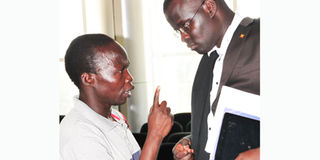Amnesty law hindering crimes trial - government

Government is caught up in a dilemma of enforcing the amnesty law it enacted or its revocation to pave way for the trial of former Lord’s Resistance Army (LRA) rebel commander, Thomas Kwoyelo.
What you need to know:
Argument. Principal State Attorney Patricia Mutesi says the Amnesty Act contravenes the Constitution.
KAMPALA.
Government is caught up in a dilemma of enforcing the amnesty law it enacted or its revocation to pave way for the trial of former Lord’s Resistance Army (LRA) rebel commander, Thomas Kwoyelo.
Principal State Attorney Patricia Mutesi yesterday told the Supreme Court that the Amnesty Act is in contravention of the Constitution because it interferes with the independence of the Directorate of Public Prosecutions (DPP), a department mandated to institute criminal proceedings.
“The Amnesty Act had good intentions and purpose but the effect of the very law shields the grave violation of Uganda’s obligation under international treaties,” argued Ms Mutesi.
Ms Mutesi was representing the Attorney General (AG) in the appeal challenging the 2011 order of the Constitutional Court directing the immediate release of Mr Kwoyelo.
She faulted the court for failing to consider the status and effect of the Geneva Convention Act and asked the court to order the trial of Mr Kwoyelo to resume forthwith.
The court held that Mr Kwoyelo is entitled to receiving amnesty just like others who renounced rebel activities after he had applied for it.
Mr Kwoyelo appeared before a panel of seven judges led by Bart Katureebe.
Other judges on the panel are: Galdino Okello, Benjamin Odoki, Dr Esther Kisaakye, John Tsekooko, Jotham Tumwesigye and Christine Kitumba.
Mr Kwoyelo, was charged with 53 cases of crimes against humanity in connection with the two-decade civil war which claimed thousands of lives.
He denied the charges before the International Crimes Court in Gulu.
Mr Kwoyelo, through his lawyers, Mr Caleb Alaka, Mr Nicholas Opiyo and Mr John Onyango, asked the court to dismiss the appeal by government, arguing that there is no international uniform standard which prohibits the grant of amnesty to him.
“Laws are made to address specific issues in historical problems and in this case, the Amnesty Act was enacted to resolve the northern Uganda crisis. Therefore such a law cannot be unconstitutional, given its contribution towards the silencing of gunshots,” argued Mr Alaka.




